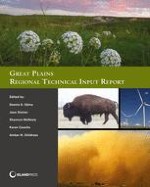
2015 | OriginalPaper | Chapter
1. Great Plains
Social-Ecological Setting (Climate-Environment-Society) Natural Resources and Wildlife Aspects
Author : Dennis S. Ojima
Published in: Great Plains Regional Technical Input Report
Publisher: Island Press/Center for Resource Economics
Activate our intelligent search to find suitable subject content or patents.
Select sections of text to find matching patents with Artificial Intelligence. powered by
Select sections of text to find additional relevant content using AI-assisted search. powered by